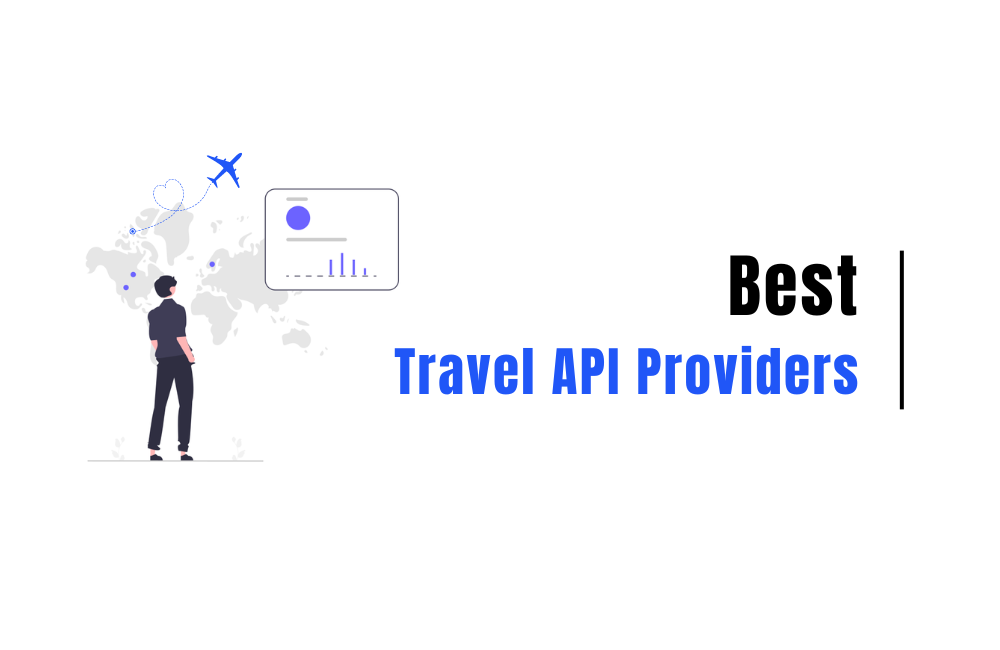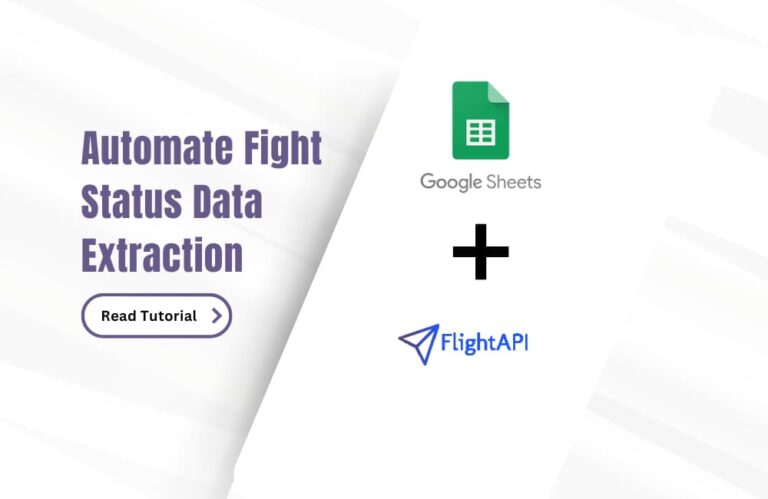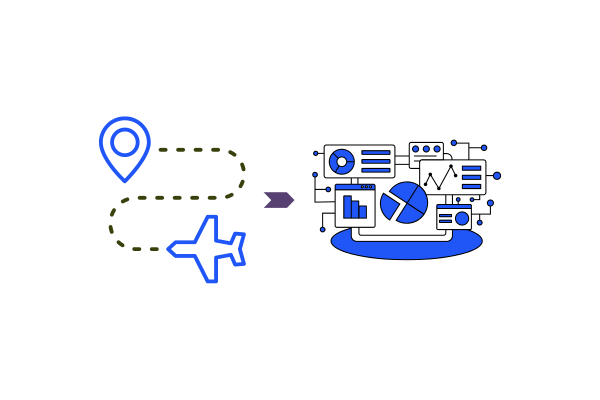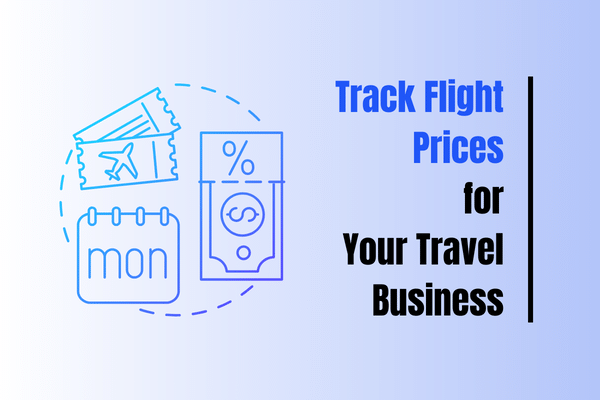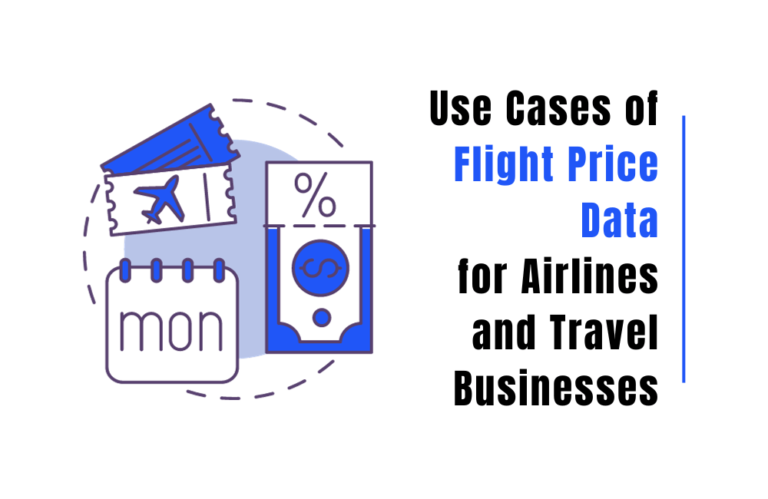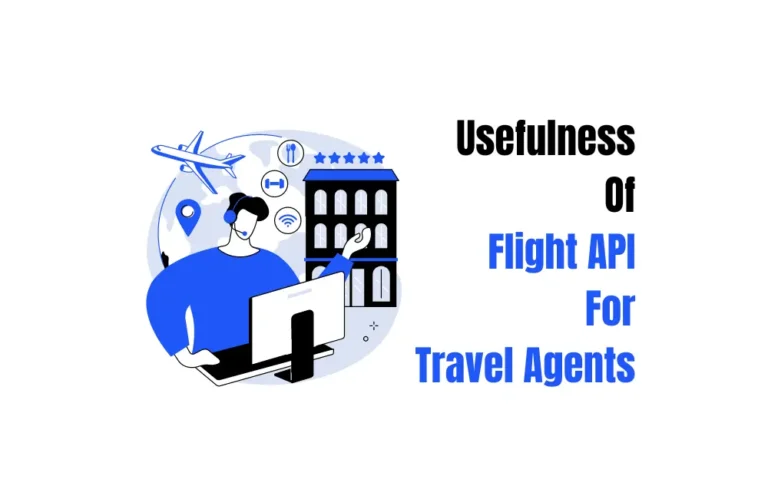Best 16 Travel APIs in 2025
The travel industry is moving fast, and APIs are behind a lot of that shift. They let developers integrate travel services straight into app, which make things easier for users.
Whether you’re building a platform to compare hotel prices, book flights, or rent cars, leveraging the right travel APIs can dramatically enhance your application’s functionality and user experience.
In this article, we will explore a curated list of the best travel APIs available and cover essential categories like hotel APIs, flight APIs, and car rental APIs. Each of these APIs offers unique features and benefits that can help you build robust travel solutions, streamline booking processes, and provide your users with the most up-to-date information.
What is Travel API and How Does it Work?
API (Application Programming Interface) in the travel industry is a set of programming instructions and standards for accessing a web-based software application or web tool.
It helps travel companies to offer their customers access to various services such as flight, hotel, and car rental reservation facilities directly on their portal.
Plus, these Travel APIs also allow travel companies to display their pricing and availability, and review data on their own website which creates a seamless experience for the customer.
So, now you probably understand, how can you provide a seamless experience to your customers with Travel APIs integration.
Let’s understand the science behind it.
Travel APIs let apps request real-time data, like flights, hotels, or prices, from providers and pull it straight into their platforms.
Travel companies can then use this information to present a customized solution to the customer, such as flight, hotel, and rental car options, prices, and availability.
And, this is how a customer can make a reservation directly on the travel company’s website, while the API handles the transaction in the background.
To help you find the best travel API, we have done the heavy lifting to research and organize information in the easiest-to-understand manner.
So, read the offerings of the 10 best API providers in the Travel industry and pick the best suitable one for you.
Best Travel APIs For Developers, Airline, Hotels and Travel Business
For everyone, we have searched and put together the best travel APIs. Whether you’re looking for hotel bookings, tour and attraction data, hotel pricing, or flight related data. We have got you covered here. So, begin your search.
Flight Pricing, Schedule, Status, Review and Booking APIs:
Whether you’re looking for flight booking, price comparison, status, or schedule data. Check out the list and choose the best fit for your specific flight data needs.
1. Flight API
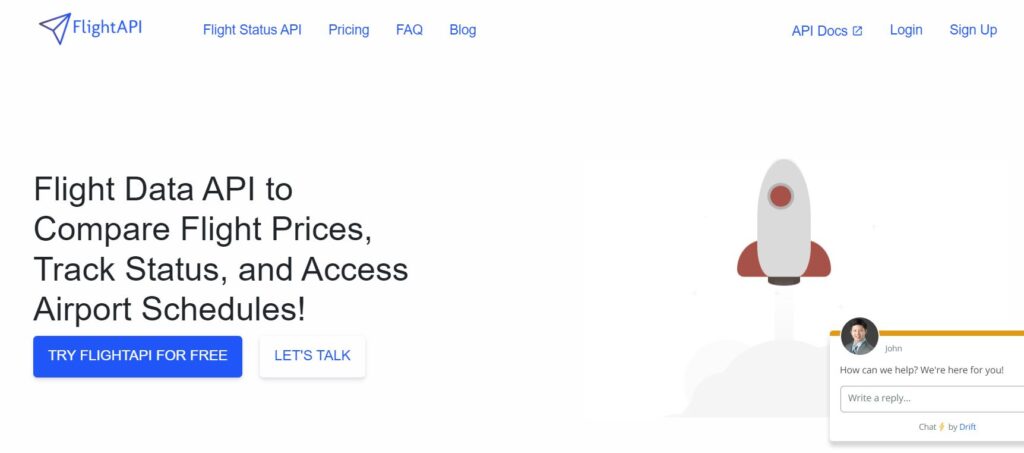
Flight API is an efficient travel API that allows travel companies to retrieve flight information, such as prices, status, and schedules from multiple airlines, and display these flight data on their own website.
By integrating with this Flight API provider, travel companies can automate the process of retrieving flight data which reduces manual effort and increases efficiency to a whole new level.
Here are the different APIs, FlightAPI offers to cater to all your flight-related needs:
- Flight Price API (for price comparison data)
- Flight Status API (for flight status data)
- Airport Information API (for data related to the airport)
If you can’t decide, whether FlightAPI is the right fit for the service & customer experience you’re looking for. We have listed the pros & cons to make the decision easier for you.
Pros: It provides real-time data, which helps travel companies offer up-to-date information to their customers.
Cons: Doesn’t facilitates booking, but works best for those looking for fast, accurate and real time flight related data.
Whether you’re a developer or prefer no-code tools, FlightAPI offers detailed tutorials to help you get started with data retrieval.
Explore the guides below:
- Track flights between airports using Google Sheets
- Check airport schedules with Google Sheets and FlightAPI
- Extract airport schedule data using Python
- Automate flight status tracking in Google Sheets
- Get flight prices between destinations using the API
2. Amadeus Flight APIs
Amadeus API is one of the most popular travel self-service that meet the needs of startups, travel businesses, and enterprises that focus on mature businesses building large travel applications.
This Self-Service API is a powerful tool that helps businesses find and compare flight locations and fares easily.
You can easily keep a track of the lowest fares, most booked destinations, and much more.
Furthermore, it is also a useful application for booking flights, analyzing flight prices, predicting arrival and departure delays, and much more.
The Enterprise Service API subscription includes nearly 200 API collections, including new REST APIs from the Self-Service API suite and older SOAP APIs that rely on the XML data format and provide broader functionality.
To get a clear understanding of this popular Travel API, check out the pros and cons of using it.
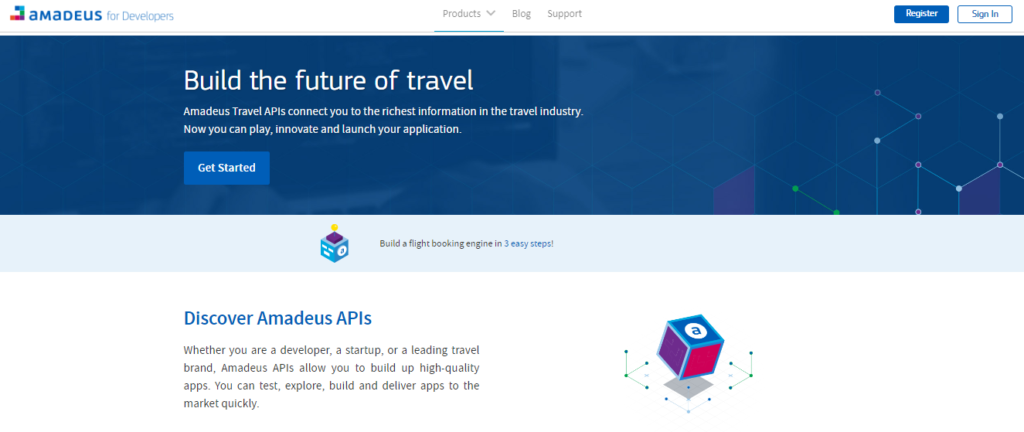
Pros: Through the portal, developers can take advantage of Amadeus APIs alongside the tools, resources, and support they need to build and launch their applications quickly.
Cons: Ticketing can only be done through consolidators, and you don’t get access to negotiated or corporate fares. Plus, Amadeus APIs are highly expensive and not easily accessible for most travel businesses.
3. Skyscanner Flight Search API
Skyscanner is one of the most renowned API Software that provides flight API solutions that help customers save the day when it comes to searching for budgeted and discounted flight fares.
It lets you search for flights with the cheapest prices on given dates with the cheapest routes as per the search query.
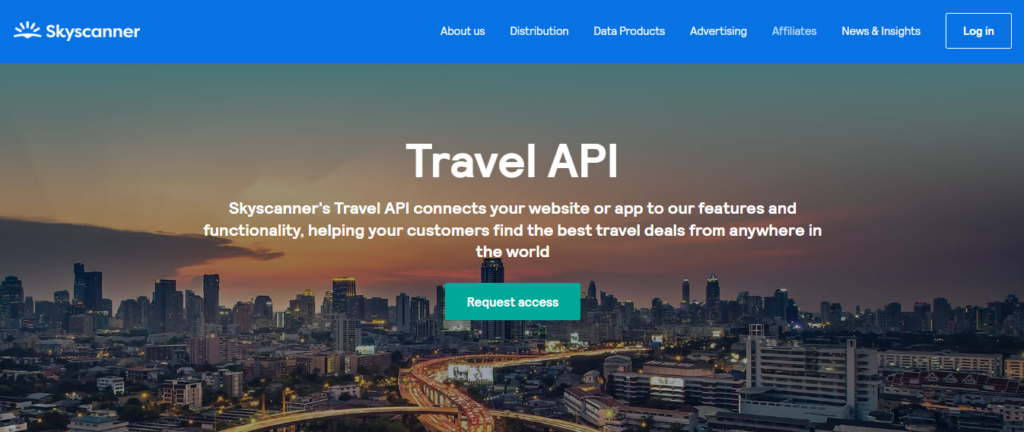
Pros – It’s easy to integrate and is available in SON, XML, JSONP response format, and URI Query String/CRUD request format and programming languages.
Cons – The API is currently available in a limited number of countries and regions.
4. Sabre Flight APIs
Sabre’s Flight Search and Booking API is a pioneer in the world of automated booking. It offers flight search, including alternate dates and airports, basic fares, rules, and other important data related to traveling in real-time. The API also provide NDC integration that allows for seamless access to the latest content and offers directly from airlines.
In addition to basic search and booking features, Sabre provides advanced capabilities like ticketing, payments, pricing, reservation management (itineraries, PNRs, etc.), seat maps, reporting, and data analytics. You can also find comprehensive integration guides to help you efficiently implement and utilize these features.
Check out the advantages Sabre provides that differentiate their APIs from others, and more importantly, uncover unseen disadvantages.

Pros – The API provides the ability to manage flight itineraries, including the ability to add or remove segments, change dates, and more.
Cons – Commercial usage of the API may be subject to additional fees.
5. Flight Aware Aero API
The Aero API is an application that delivers customized access to developers seeking data from millions of flight status inputs for any application using REST/JSON.
It is an easy-to-integrate, flexible, and scalable tool that provides both current and historical flight data.
Users can easily retrieve flight data through AeroAPI Including, flight tail number, aircraft type, origin and destination of the airport, time the last position was received, and much more.
Flight Aware Aero APIs have a lot of features to offer. If you are considering integrating this APIs into your application, a mobile app development team can assist in ensuring a smooth and efficient implementation.
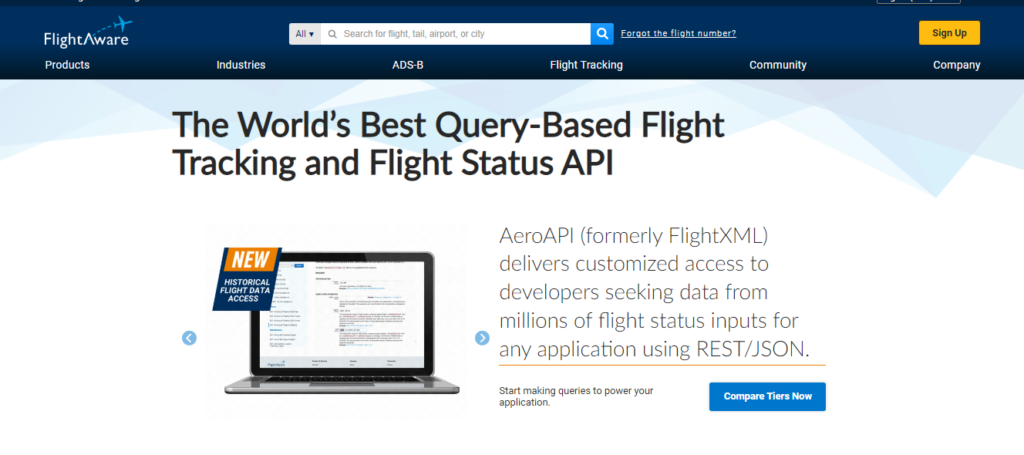
Pros – Provide a quick and easy way to find information about airports and flights.
Cons – The accuracy of the data provided through the Aero API can be a concern, as the data is subject to change and may not always be up-to-date.
6. TripAdvisor
TripAdvisor is an Airline Review API Provider that continues to maintain its presence as the world’s leading travel platform that helps multiple travelers plan their best trip across the globe.
One can browse millions of customer reviews and experiences on different airlines, and cruises on its platform.
Despite that, TripAdvisor also offers a hotel room availability API, which helps customers find room availability in their desired tourist destination.
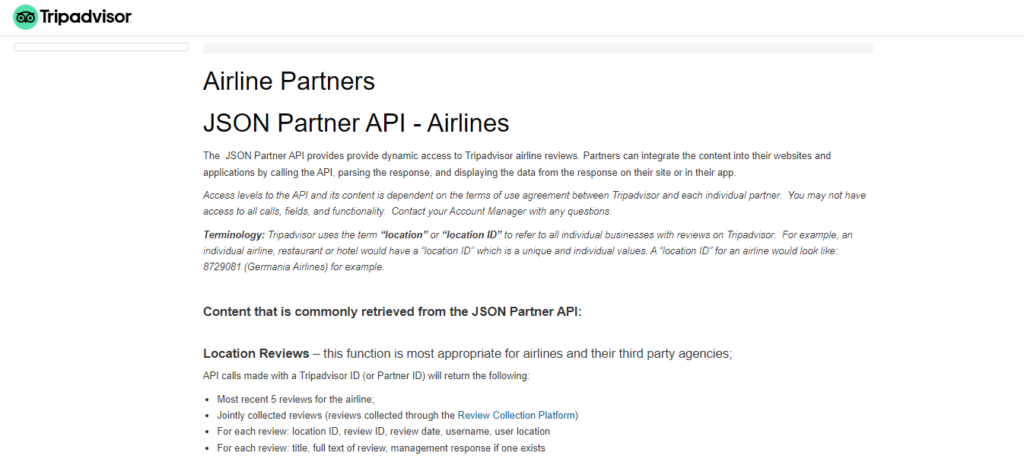
Pros– The API provides personalized travel recommendations based on user preferences and history.
Cons – The availability of data depends on various factors such as real-time updations, reliable sources, fluctuating prices, and changing market demands.
7. Travelfusion API
Travelfusion API is a flight and stay accumulator that works with hundreds of low-cost airlines and scheduled carriers.
It offers –
Direct Connect XML API – It ensures real-time availability of the database and a fully automated booking process
Fast API – It is a new and lightweight product for rapid integration with any platform.
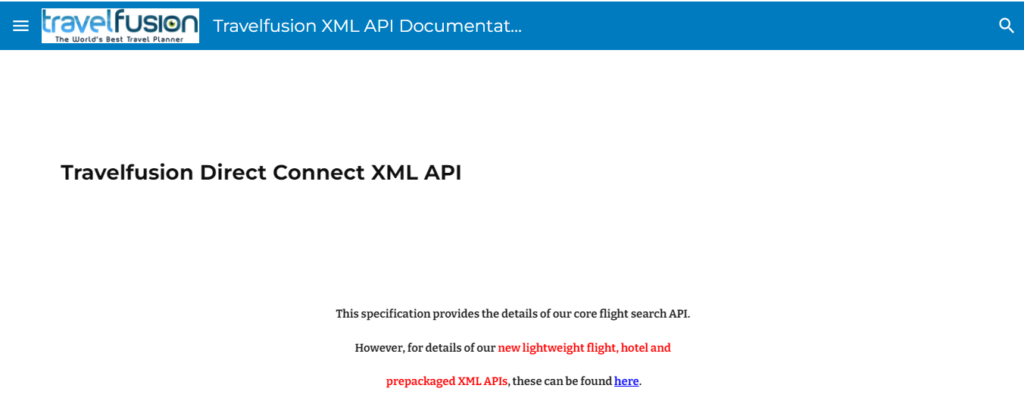
Pros – This Flight Search API provides the ability to search for flights based on a variety of criteria such as departure and arrival cities, dates, and more.
Cons – Flight data provided by the API is subject to change and may not always be accurate or up-to-date.
8. Kiwi APIs
Kiwi Flight API is renowned for its robust flight search engine that helps you easily access information on about 700+ airlines, including over 200+ low-cost carriers.
Plus, this platform also provides virtual interlining services that combine separate flights into seamless itineraries.
You can use this API to find carrier IDs and logos, acquire data on locations (cities, airports, and more), search for itineraries — one-way and return flights, multiple city trips, the cheapest routes if possible, and much more.
In addition to that, you can book flights and order baggage, confirm payments, and process refunds.
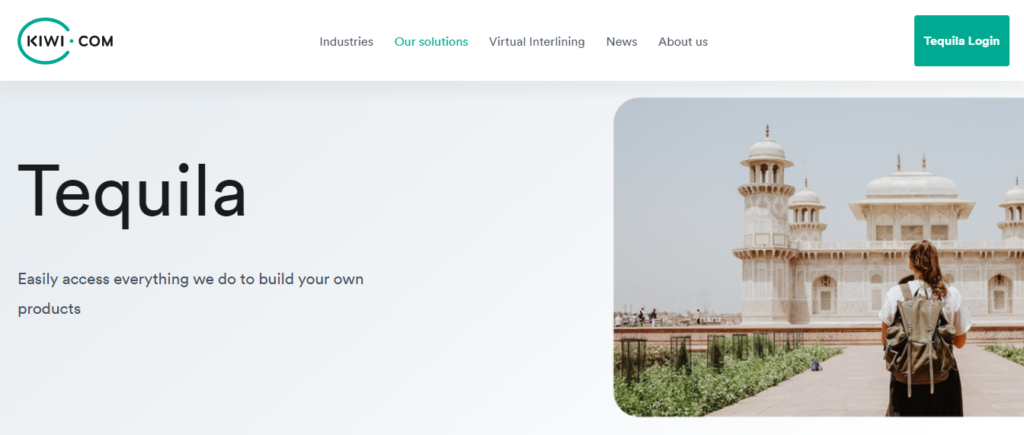
Pros – The API provides the ability to make bookings for flights and hotels
Cons – The API is currently available in a limited number of countries and regions.
Hotel Pricing, Availability, and Booking APIs:
9. MakCorps Hotel API
MakCorps Hotel Price Comparison API is a game-changer in the travel industry. With a single GET request, it allows you to access hotel price comparison data from over 200 Online Travel Agencies (OTAs). So, from now no more tedious & time-consuming manual searches. Because MakCorps Hotel API is here to simplify and accelerate the process.
Plus, this API not only offers real-time pricing but also offers historical data to help online travel agencies, hotel chains, and other businesses that require hotel price comparison data to make informed decisions.
To learn more about this API, head over to the documentation page.
Pros: Easy documentation and access to real time and historical pricing data.
Cons: Doesn’t offer hotel booking.
10. Hotelapi.co
Hotel.co offers a potent Hotel Price API which provides real-time rates from all major online travel agencies in one simple GET request. This API empower your business with data-driven decisions, effortless integration, and accurate pricing data.
In addition to that, it also provides transparent pricing options that caters to business with all sizes and budget.
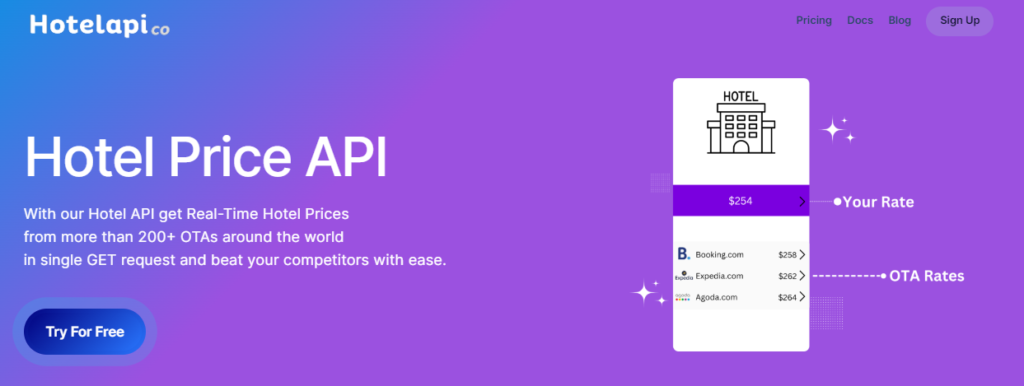
Pros: Delivers real-time rates from major OTA platforms with one GET request which enable data-driven decisions and easy integration.
Cons: Doesn’t support hotel booking integration.
11. Hotels.com API
Integration of hotel.com API allows customers to search for hotel rooms, pricing, facilities, locations, and much more through their powerful platform.
This API is included on the list of the best hotel API providers which is designed to help developers integrate Hotels.com’s booking functionality into their own applications and websites.
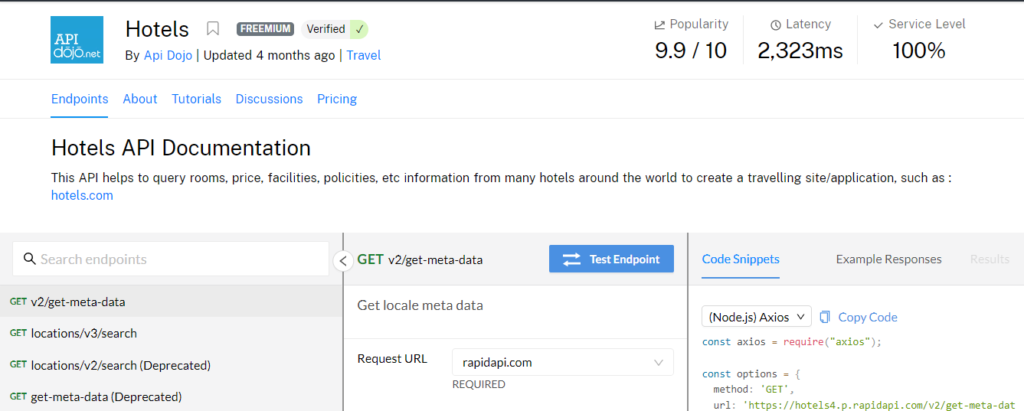
Pros – The API provides the ability to make bookings for hotels, including the ability to retrieve, create, and modify bookings.
Cons – There may be limitations on the number of API calls that can be made by a single user or application, and commercial usage of the API may be subject to additional fees.
Pro Tip: If you are struggling to pull data from an API and combine it with your existing, siloed data, Acuto can help. With a custom solution that centralizes your data from multiple sources, you can unlock a lot more insights. Check out their agency automation solutions to learn more.
Pros– The API provides personalized travel recommendations based on user preferences and history.
Cons – The availability of data depends on various factors such as real-time update, reliable sources, fluctuating prices, and changing market demands.
12. Booking.com
Booking.com is a useful travel API for developers that allows them to gain insights on room availability, prices, facilities, policies, and other hotel data to use in other functions.
It can help your website or app to get enriched with important information it needs to provide your customer’s accurate and real-time info.
If you’re looking for the best API for travel website to book hotels directly, this hotel booking API can be integrated into your portal.
However, you still need to check out the pros & cons.
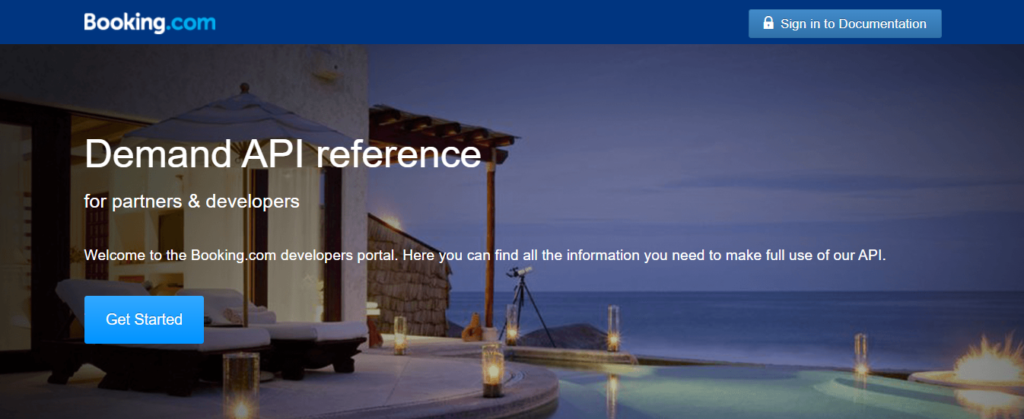
Pros – This Travel API offers the ability to make bookings for hotels and accommodations, including the ability to retrieve, create, and modify bookings.
Cons – Using the Booking.com API may incur fees, which can be a significant cost for developers and businesses.
14. Hotelbeds API
Hotelbeds launched their Booking API to simplify integrating hotel reservations into any website or app. Partners can tap into real-time access to Hotelbeds a huge collection of accommodations around the globe. This makes it smooth for users to search options, confirm bookings, manage reservations, and more.
Getting set up is straightforward – just register for a free API key, fill out your profile so Hotelbeds can tailor it to your business needs, get certified with some one-on-one support from their API experts, and then go live to start facilitating actual bookings.
Apart from Booking API, Hotelbeds also provides Hotel Content API packed with descriptive details, photos, amenities, and other rich information on hotels.
Together, these APIs are designed to empower travel agencies, tour companies, and travel tech startups to offer their customers a comprehensive selection of places to stay.
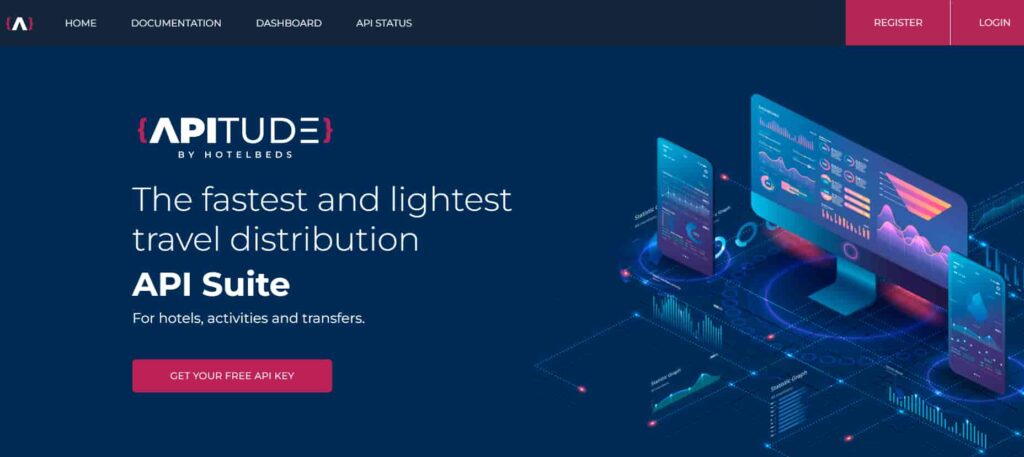
Pros: Offers real-time access to a vast global accommodation inventory.
Cons: The integration process may require technical expertise.
15. Cloud Beds API
Cloudbeds is a leading hospitality software provider that offers a robust API (Version 1.1) designed to streamline hotel operations.
It serves 157 countries and is integrated with over 600 partners Cloudbed’s API showcases the company’s global reach and reliability which makes it an invaluable resource for tech partners and property managers striving to achieve operational excellence and exceptional guest satisfaction.
This powerful API serves as a bridge that grants access to critical guest data, reservations, and other essential information. It supports standard HTTP methods like GET, POST, and PUT to deliver responses in JSON format over secure HTTPS connections.
This API is tailored for developers and hoteliers seeking to enhance customer experiences, the Cloudbeds API offers comprehensive documentation on available methods, parameters, and response examples.
It incorporates rate limits to maintain optimal performance during high-demand periods and includes a dedicated Reporting API for accessing valuable insights.
A standout feature is its adjustment management functionality that enables users to easily manage reservations by adding, deleting, and retrieving adjustments.
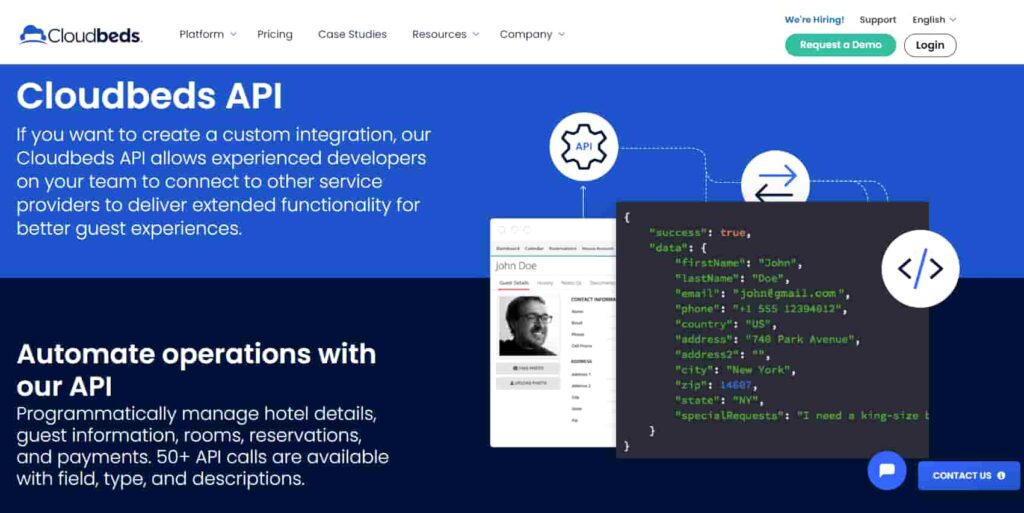
Pros: Global reach and secure access to hotel data.
Cons: Rate limits may affect high-demand access.
Tours, attractions, and experiences
16. Get Your Guide API
Founded in 2009, Get Your Guide is not just a website for searching excursions, activities, and tourist attractions. It also helps partners integrate tours, activities, and attractions into their platforms.
Specifically, Get Your Guide offers an API that provides partners with access to its extensive inventory of bookable experiences around the world.
This includes real-time availability, pricing details, and booking cancellation that partners can directly incorporate into their sites and apps. The aim is to empower travel companies to enhance their offerings and customer experience.
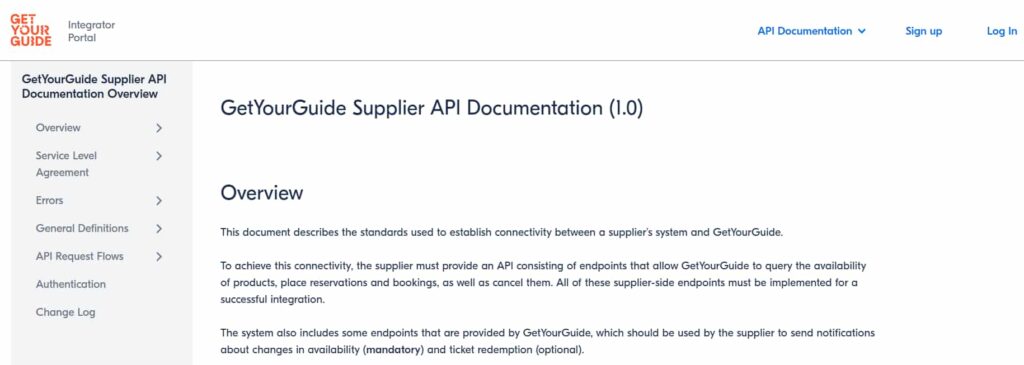
Pros: Vast global inventory of experiences with real-time availability and booking.
Cons: API complexity for customized user experiences can be challenging.
Car Rental And Booking APIs
17. CarTrawler
With 1700+ car rental suppliers and 250+ travel partners, Car Trawler is making booking rides and transportation a smooth process across different apps and websites.
It’s designed to integrate rental cars, taxis, and airport shuttles into any travel platform. This way companies can give their customers access to tons of transport options in one place, instead of forcing them to book everything separately.
By teaming up with CarTrawler’s tech, businesses can not only improve the experience for users but also unlock new revenue streams to meet the growing demand for all-in-one trip planning. The API helps developers connect their apps or sites to an extensive network of rental car companies, taxi fleets, and rideshare services in 150+ countries worldwide.
The goal is to be flexible, whether you’re an airline adding ground transportation booking, or an online travel site looking to expand your offerings beyond flights and hotels. As more travelers look for seamless end-to-end journey planning, the CarTrawler API aims to scale up to fit the needs of any travel business ready to provide greater convenience.
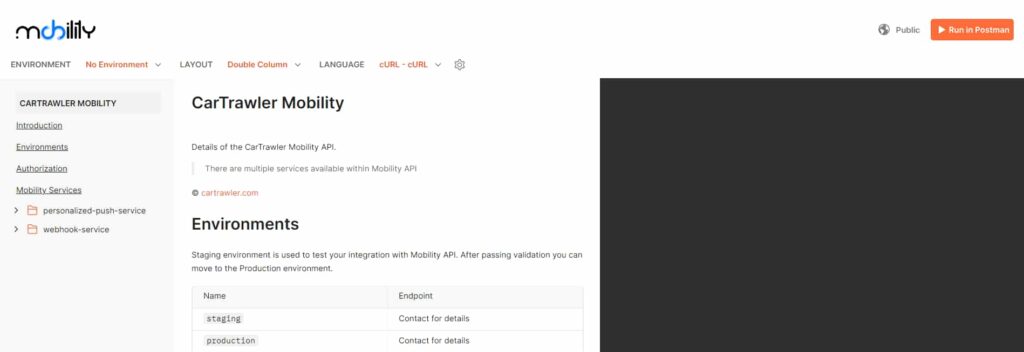
Pros: Vast network of car rental suppliers that facilitates global transportation access.
Cons: Booking processes and support faced criticism.
Benefits Of Using Travel APIs
The travel sector is undergoing a significant transformation with technology.
Insights from the travel and tourism market on statistica.com indicate that by 2028, a whopping 76% of the industry’s total revenue is expected to come from online sales.
This means that for businesses to succeed in this crowded marketplace, they must deliver their services quickly and affordably, and make decisions informed by data to distinguish themselves.
This is where Travel APIs come into play, and here are several benefits it provides-
- Optimize operations & lower costs: Manual processes like recording reservations and customer data often lead to errors and inefficiencies. Travel APIs seamlessly transfer information across applications to eliminate redundant data entry. This dramatically cuts down overhead costs and unnecessary man-hours.
- Quickly adapt offerings to market demands: Launching new customized travel products typically requires significant development time. However, travel APIs allow on-demand access to real-time industry data and pre-built tools to prototype and validate new offerings rapidly. This agility is key for capturing emerging consumer trends.
- Personalize the traveler experience end-to-end: Travel APIs aggregate relevant services and data to enable tailored recommendations and comparisons. Customers can evaluate multiple options based on budget, location, brand affinity, etc. and book customized packages on one platform. This convenience helps improve engagement and loyalty.
- Monetize through additional revenue streams: Beyond air, hotels, and rental cars, travel APIs integrate ancillary services like travel insurance, local tours/activities, ride-sharing, and more into the booking flow. This expanded product portfolio drives higher cart values while providing travelers with a streamlined one-stop experience.
- Achieve scalability and future readiness: Because of the rapid evolution of technology, the playing field can change overnight. Leveraging flexible and scalable Travel API platforms future-proofs business growth by simplifying the integration of new data sources or third-party services down the line.
How To Choose The Best API for Your Travel Business?
Different business has different needs. Therefore, choosing the right API that your business needs to thrive is crucial. We have put together a few key considerations that you need to keep in mind while exploring Travel APIs for your business.
Here are they-
1. ) Data Type & Coverage: First of all, you need to know what data you need. There is no one-stop travel API available that has it all with quality data and integration. So, you need to decide your data requirements and start exploring APIs that fulfill the same. Many APIs provide free trials, so go ahead to take them to check the data quality.
2) Pricing & Plans: Once you select the suitable APIs for your data and project requirements. Evaluation of their pricing, plans, and API call offerings and discounts if any. Select the API which fits best with your budget and requirements.
3) Data Quality: Data quality can make or break your business. Opt for the API that provides real-time, accurate data. You can also ensure the data quality by simply scanning the website offerings, and their reviews on the internet and using the free trial.
4.) Ease of Integration: Quick and easy integration is paramount. Go through the API documentation and the process of integrating particular APIs into your preferred applications and other business operations.
5) Opt API Provider That Facilitates Quick Support: Always, I repeat always choose the API provider that provides quick support. While API integration, it’s normal to face issues. On-time support will help you avoid delays and save your time in figuring everything out on your own.
Frequently Asked Questions:
Is There Any Free Travel API for Developers?
There’s no such thing as a completely free travel API. However, if you only need to make a few API calls for a product or assignment, FlightAPI has got you covered. Simply sign up for the free trial and get 50 API calls on your first registration. Give it a try!
Who Can Use Travel APIs?
Travel APIs can be used by a variety of clients, including travel agencies, online travel booking platforms, airlines, hotel chains, car rental services, tour operators, corporate travel management companies, and app developers. These clients use travel APIs to access real-time data on flights, accommodations, car rentals, tours, and other travel services to enhance their offerings, streamline operations, and provide customers with comprehensive travel solutions.
What are the Types of Travel APIs?
Here are the Travel API types:-
- Flight APIs: Flight booking, price comparison, status, schedule, and IATA code data.
- Hotel APIs: Hotel searches, price comparisons, reservations, detailed property information, reviews, and room availability checks.
- Car Rental APIs: Compare, and book rental cars from various suppliers, often including options for insurance and vehicle types.
- Weather APIs: Provide forecasts, real-time weather conditions, and historical weather data for travel planning.

